How Menopause Messes with Your Sleep

During menopause, a good night's sleep might seem like merely a dream.
The hormonal, physical and psychological ramifications of menopause are not just limited to things like hot flashes, mood disorders, and weight gain.
They're lurking in the evening hours, too, when all you want to do is sleep. It comes as no surprise, then, that women report the most sleep problems during this time of extreme hormonal upheaval, according to the National Sleep Foundation.
That's why you're likely to:
- Wake up and be unable to fall back asleep at 3 a.m.
- Be unable to fall asleep in the first place.
- Be awakened throughout the night (usually accompanied by a pool of sweat).
And if your partner is complaining about your snoring, well, there's that, too. Snoring is more common and more severe around this time, particularly among women who are postmenopausal.
It's a cruel twist of fate, don't you think? The more we crave sleep, the more sleep eludes us.
First, the obvious and not-so-obvious culprits:
- Hormonal changes. One fallout of falling estrogen is hot flashes (or night sweats, in this case). They can rouse you from a deep sleep as fast as you can forget someone's name (another side effect of menopause). Night sweats—those intense and sudden sensations of your body being on fire—can occur once a night or can happen multiple times each night, thus interrupting your sleep repeatedly. (With a single hot flash lasting anywhere from one to five minutes, you don't have to do the math to understand that can add up to a whole lot of lost sleep.) These heat surges can be somewhat bothersome (a little perspiration … no biggie) to extremely troublesome and inconvenient (soaking your nightgown … and your sheets). All that sweating is your body's way of helping you cool off and stabilizing your core temperature, so it's really not a bad thing. Until it keeps you from sleeping.
- Melatonin. Melatonin is another type of hormone whose production can malfunction during menopause because levels decrease. This hormone plays a mega-important role in your circadian rhythm and regulates your sleep-wake cycle, so problems occur when the hormone levels fall.
- Mood swings and depression. Which comes first: sleep deprivation or mood disorders? It's hard to say, but lower levels of estrogen can lead to anxiety, stress, irritability or depression—all things that bad sleep is made of.
- Bathroom breaks. If you're shuffling to the bathroom in the middle of the night, you're in good company with about 50 percent of older adults who are also waking up to pee. And getting back into the sleep groove can be mighty difficult once you've walked that walk.
Unfortunately, sleep deprivation during menopause carries more worries than just being tired, forgetful and foggy the next day.
It can pack on the pounds: There's a 50 percent higher risk of obesity if you get less than five hours of sleep each night, according to Johns Hopkins' researchers. That's because with less sleep, your body produces more of the hormone ghrelin, which is known as the "hunger hormone," and less of the hormone leptin, which helps regulate hunger and control your appetite.
All of which is to say that despite menopause messing with your sleep, there are good reasons to persevere and fight. And you can!
Here's how:
- Avoid large meals, especially right before bed. Steer clear of foods that are spicy or acidic, which may trigger hot flashes. Alternately, foods rich in soy, like tofu, soymilk and miso may help minimize hot flashes.
- Stay away from alcohol and caffeine, especially before bedtime. It takes about six hours for one half of the caffeine you consume to be eliminated from your body. And although a few drinks can make you drowsy and initially make it easier to fall asleep, keep in mind that, ultimately, alcohol disturbs your sleep and makes you more restless during the night. It's also a diuretic, which can cause you to need to urinate more frequently.
- Dress in lightweight, breathable sleepwear made of natural fibers (like cotton). Or sleep in nothing at all. Avoid heavy blankets, crack open the window or use a fan or air conditioner to help cool the air.
- Manage your stress as much as possible. Meditation, deep breathing, yoga and exercise are all effective ways to relax, especially before bed. Same goes for a warm bath. Cognitive behavioral therapy has also been shown to be extremely effective in treating insomnia.
- Keep you room cool, dark and quiet. Experts agree the temperature should be around 65 degrees Fahrenheit. A sleep mask can help to block out any light that might interfere with your sleep, and earplugs can help muffle noise that can keep you up.



